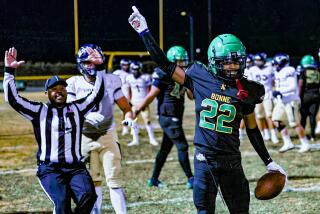NCAA Report Details Gifts DuBose Received : Notre Dame: Eligibility staff rules that linebacker received about $1,300 in improper benefits.
- Share via
Star linebacker Demetrius DuBose of Notre Dame received more than $1,000 in improper benefits, including a $600 loan and a $300 cash payment, from a Seattle couple with ties to the university, the NCAA said in a report made public Wednesday.
Those activities and others stemming from DuBose’s dealing with the couple prompted the NCAA eligibility staff to suspend the senior All-American candidate for the Notre Dame’s first two games, marking the first time the NCAA has levied a sanction stronger than a public reprimand against the school or one of its athletes.
Notre Dame Athletic Director Dick Rosenthal said the school will not appeal the decision, which covers games against Northwestern and Michigan.
Making his first public statement on the matter at a campus news conference Wednesday, DuBose said: “I still don’t feel I did anything wrong. . . . This is tough to deal with, because the last thing I wanted to do was have anything reflect negatively on the university.”
DuBose’s suspension, announced Tuesday by the university, is a result of his dealings with Grant E. Courtney, president of the Western Washington Notre Dame Alumni Club, and Courtney’s wife, Rose, a former Notre Dame admissions officer. Grant Courtney, a Seattle lawyer, received a law degree from Notre Dame.
The NCAA eligibility staff ruled that DuBose, who attended Seattle’s Bishop O’Dea High, received about $1,300 in improper benefits from the couple. In addition to the $600 loan and the $300 payment--money that financed a spring break trip, according to the NCAA report--the benefits included clothing, meals, funds to purchase school supplies and unspecified “care packages.”
NCAA rules prohibit representatives of a school’s athletic interests from providing athletes with benefits not available to the school’s student population. As a condition for returning to competition, DuBose must repay the $1,300, the NCAA report stated.
According to the report, the eligibility staff also determined that a series of relatively minor recruiting violations occurred in DuBose’s dealings with the couple. Those violations include improper automobile transportation and improper telephone and in-person contacts.
The report said that the NCAA enforcement staff and NCAA Committee on Infractions will review the matter to determine Notre Dame’s institutional responsibility. Institutional penalties can range from a reprimand to a ban on postseason competition.
Such a review is standard procedure in NCAA eligibility cases. Rosenthal said Tuesday he does not believe the DuBose case warrants an institutional penalty.
DuBose said he met Grant and Rose Courtney through a high school “career night” that was staged about a year before his recruitment by Notre Dame as a football player.
The couple did not force Notre Dame on him, he said, and in fact told him they would remain his friends no matter where he decided to attend college.
“The loan, I didn’t look at it as something from alumni,” DuBose said. “It was more along the lines of (a) friend-to-friend (transaction). I mean, those people, I had been friends with them since high school, before I was recruited by Notre Dame.
“It’s just an unfortunate situation.”
DuBose’s longstanding friendship with the couple apparently was a crucial factor in the NCAA’s decision not to penalize the player more severely.
According to Janet Justus, NCAA director of eligibility, Notre Dame officials became aware of the relationship “in the past year,” but did not “raise a red flag” over it.
According to the report, the NCAA could not find evidence that DuBose had received a loan of $5,000 from the couple, an amount reported by The Times. The report confirmed that the NCAA examined the circumstances surrounding a $25,000 auto loan obtained by DuBose, but said no finding of wrongdoing could be made.
The auto loan required only a single “balloon” payment, due early next year. At that time, DuBose will have run out of eligibility and would be able, under NCAA rules, to accept advance payments from a sports agent.
Justus said it could not be determined if DuBose used his potential as a professional football player in violation of NCAA rules to obtain the loan.
“All I know is (Notre Dame) did talk to bank officials and concluded that (the loan) was not based on his potential as a pro football player,” she said. “The bank said it was their decision to give the loan and said it did not give it on (DuBose’s) ability as a football player to repay.”
More to Read
Go beyond the scoreboard
Get the latest on L.A.'s teams in the daily Sports Report newsletter.
You may occasionally receive promotional content from the Los Angeles Times.










